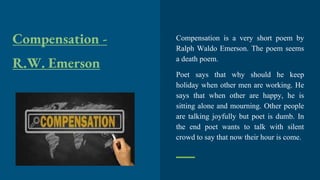Compensation - R.W. Emerson
Download as PPTX, PDF0 likes65 views
Compensation is a brief poem by Ralph Waldo Emerson that explores themes of isolation and mourning. The poet reflects on his own sorrow while others work and celebrate around him. Ultimately, he seeks to communicate with the silent crowd, indicating a shift in moments of joy and grief.
1 of 1
Download to read offline

More Related Content
More from Dhruvita1 (20)
Recently uploaded (20)
PDF
Indian National movement PPT by Simanchala Sarab, Covering The INC(Formation,...Simanchala Sarab, BABed(ITEP Secondary stage) in History student at GNDU Amritsar ╠²
PPTX
Iv├Īn Bornacelly - Presentation of the report - Empowering the workforce in th...EduSkills OECD╠²
Indian National movement PPT by Simanchala Sarab, Covering The INC(Formation,...Simanchala Sarab, BABed(ITEP Secondary stage) in History student at GNDU Amritsar
╠²
Ad
Compensation - R.W. Emerson
- 1. Compensation - R.W. Emerson Compensation is a very short poem by Ralph Waldo Emerson. The poem seems a death poem. Poet says that why should he keep holiday when other men are working. He says that when other are happy, he is sitting alone and mourning. Other people are talking joyfully but poet is dumb. In the end poet wants to talk with silent crowd to say that now their hour is come.